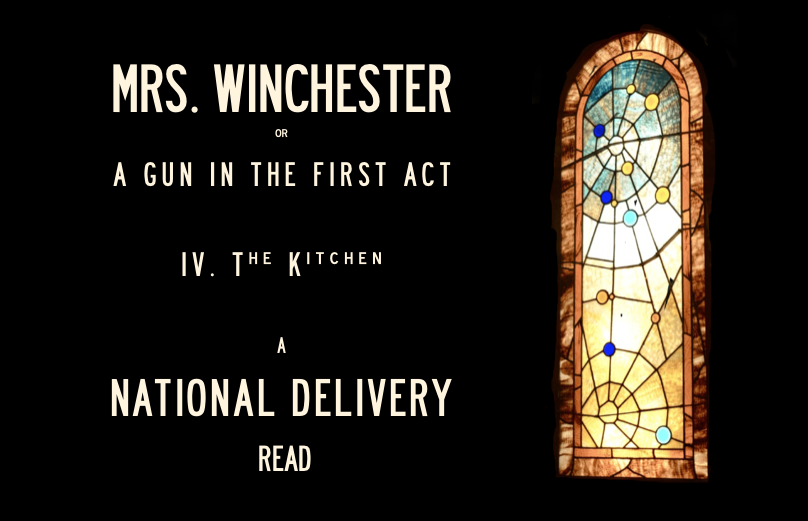Mrs. Winchester IV. The Kitchen

When I decided to expand Llanada Villa, my first thought was, of course, “Where to begin?” This led to an unexpected second thought: “Which room in a house is the most important?“ A pointless question, as pointless as wondering which part of a body is the most important. Each is necessary, each is special, each is vital. However pointless the question, it did make me realize that rooms in a house tend to correspond to particular parts of the body. For our brain, we have the study, for our heart, we have the bedroom, and for our gut, the kitchen. Since we begin most days with breakfast, I would begin with the kitchen.
The original farmhouse kitchen I found charming, and left it mostly intact. This is the second of six kitchens, and the first of my design. I drew up a floor plan exactly to my liking, and showed it to our builder who cocked an eyebrow. Occasionally, I seek a contractor’s opinion, and occasionally I agree with it. I made a few minor revisions, then put him work without further deference to his eyebrow. This is largest and best equipped kitchen of the house, and it gets the most use.
Construction took thirteen weeks. It would have taken twelve, but I asked the crew to slow down and savor the finish. “Take another week,” I said. “At half speed and double pay”. They were mystified, but they obliged. A common occurrence here.
Once the racks and cabinets and drawers were in place, it was time to fill the room with cookware. All of it - the American Dutch ovens (designed by Paul Revere, did you know?); the startling and irregular Scandinavian wooden spoons; the iron “wok” - which I had mistaken for a Chinese helmet! - all of it - all of this varied and wonderful and far-sourced cookware was obtained from a visionary importer in San Francisco. All of it, that is, except for the cutlery. That gleaming display of cleavers and boning knives and blades of all sort was made by a craftsman known to Mr. Gallegos from Los Angeles - a small town to the south. They are the pride of the kitchen. When I saw them, I could not wait to chop my first onion.
And my first chopped onion it would be. For here, I must confess: just as I have designed this house without ever having hammered nail through board, I have not once prepared a full meal. Not once, to this day. A fried egg, yes; a pot of porridge, yes, a full meal, never. But! I have eaten my share of artfully executed meals, and I have paid attention. This kitchen was completed on a Thursday, and my favorite holiday was exactly one month out. For my first California Thanksgiving, I would design a feast.
There was only one problem. On that day, and on every subsequent day up to and including the holiday, I had no appetite.
If there is one word to define being fully alive, it is “appetite”. I did eat, but without any anticipation or enjoyment of food. And what I ate was simply food - an apple, nuts, perhaps an egg, a lettuce. I did not eat meals. I ate, not to subsist but because that was how one marked the day. I had promised my crew and their families a feast, and I would keep my promise, but it must wait until Christmas. That Thanksgiving - my first, in this house, in the west - I would celebrate in a decidedly untraditional way.
I would fast. The rest of America would feast; I would fast. And how curious: remove one letter, and “feast” becomes “fast”.
Not unlike like the rest of the country, I was with my family on the holiday. But I was with them in the only way I could be - alone, in this house, in the warmth of a few candles and what flickered in my heart. I set up a chair right here, by the kitchen window, and watched the short light of that November day slowly, inexorably, fade.
At some point, I rose from the chair, fully alert, my senses perhaps sharpened by the lack of repast, and stood in admiration of all the pristine, perfectly articulated cookware: the pre-seasoned frying pans, the unstained silver stock pots, the pot-bellied stove which stood like a hungry dwarf awaiting to digest its first coal.
Was I hallucinating from hunger, or did I feel a rebuke? From the sauce pans whose bottoms begged to be blackened? From the butcher’s knife that ached to bite into bone? From all of these sculpted tools that yearned to be bruised and dimpled and sullied and blistered by the bringing forth of provender?
I felt shame. I felt implicated. And then I felt, as much as heard, the doorbell ring.
Mr. and Mrs. Gallegos held out a small basket. “Happy Thanksgiving”, they said.
“What is this?” I said.
“Tamales,” they said.
“Two Mollys?” I said?
“Tamales,” they said. “Tamales de turquía”!
“Tamales!” I said. “Of turkey!”
“Bueno!” they said.
I held the warm basket. An earthy, zesty, sweet steam rose from it.
“Gracias,” I said.
They nodded, got into their carriage, and rode off.
There was only one place for me to go.
From Mrs. Winchester, or, A Gun in the First Act by Joe Christiano
Next: A Table for One